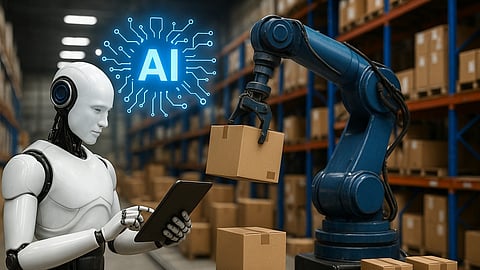Insight: Why AI is Essential for the Future of Logistics
The logistics industry has always been about precision: getting the right product to the right place at the right time, for the lowest possible cost. But the world it operates in has changed.
Global supply chains have grown too complex, customer expectations too high, and margins too thin for manual or reactive operations to keep up. Artificial intelligence (AI) isn’t a “nice to have” anymore, it’s becoming critical to sucessful next-generation logistics operations.
Real-Time Decision Making at Scale
Traditional logistics relies heavily on fixed planning models and human judgment. That works, until it doesn’t. When fuel prices fluctuate daily, ports back up for weeks, or weather shifts disrupt entire shipping routes, static planning tools fail.
AI changes that by processing massive amounts of live data - from sensors, GPS trackers, weather forecasts, and demand systems - to predict and adjust in real time.
For example, AI-driven route optimization systems can instantly recalculate delivery paths when a delay occurs, minimizing fuel waste and downtime. Machine learning models can even anticipate bottlenecks before they happen and reroute shipments accordingly.
Insight: AI as a Strategic Lever for Real-Time Supply Chain Decisions
This ability to make split-second, data-driven decisions is something no human-run system can match. It’s the difference between reacting to disruptions and neutralizing them before they hit.
Predictive Maintenance and Asset Longevity
Fleet downtime is a logistics killer. Every idle truck or grounded plane burns money. AI predictive maintenance tools analyze sensor data from engines, tires, and brakes to forecast when components will fail, sometimes weeks in advance.
Instead of relying on scheduled check-ups, operators can service vehicles precisely when needed, extending equipment life and reducing unscheduled repairs. The result: fewer breakdowns, lower maintenance costs, and a much more reliable delivery network.
Smarter Warehousing and Inventory
AI is redefining what a “smart warehouse” means. Autonomous robots and computer vision systems now work alongside humans to pick, sort, and pack with near-zero error rates. Machine learning models monitor inventory in real time, automatically reordering stock based on demand forecasts and seasonal patterns.
For retailers and manufacturers, that means no more overstocking or stockouts, both of which are major profit drains. And as e-commerce growth keeps straining fulfillment centers, AI helps warehouses scale operations without simply throwing more people at the problem.
Sustainability and Cost Efficiency
Fuel optimization, route planning, and predictive demand modeling all directly cut emissions and waste. AI doesn’t just make logistics faster - it makes it cleaner. As environmental regulations tighten and sustainability reporting becomes mandatory, companies that deploy AI to cut carbon will gain both cost and compliance advantages.
What Happens to Companies That Don’t Adapt
The harsh truth: logistics companies that don’t embrace AI will be left behind. Within a few years, their cost structures will simply be uncompetitive.
Without AI, they’ll face:
Higher operational costs, due to inefficient routes and idle assets.
Lower reliability, as manual planning can’t adapt to real-time disruptions.
Customer loss, as clients gravitate to faster, more transparent, AI-driven providers.
Workforce strain, as human planners are forced to manage data volumes far beyond what’s realistic.
It won’t happen overnight, but the shift is already visible. Major logistics players, from DHL and FedEx to Maersk, are pouring billions into AI-powered analytics and automation.
Startups built around AI-native logistics models are entering the market leaner, faster, and cheaper. Once those efficiencies hit scale, traditional firms will find it almost impossible to compete without similar capabilities.
The Future is Predictive, Not Reactive
AI isn’t replacing logistics expertise; it’s amplifying it. The future of logistics will be defined by prediction and prevention, not reaction and recovery. Every link in the chain, from forecasting demand to scheduling trucks, will run on data that learns and improves over time.
Companies that embrace AI now will build networks that are faster, cleaner, and far more resilient. Those that wait will find themselves stuck in an old model that is slow, manual, and eventually irrelevant.
In logistics, timing is everything. The same rule applies to adopting AI.
Read More: From Paper Trails to Predictive AI: How Digitalisation is Rewiring Global Logistics


